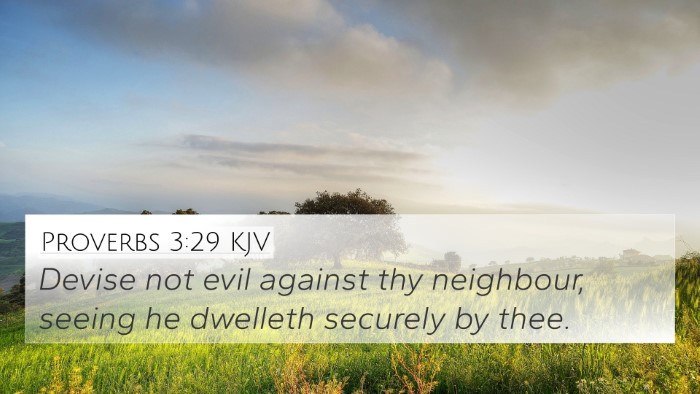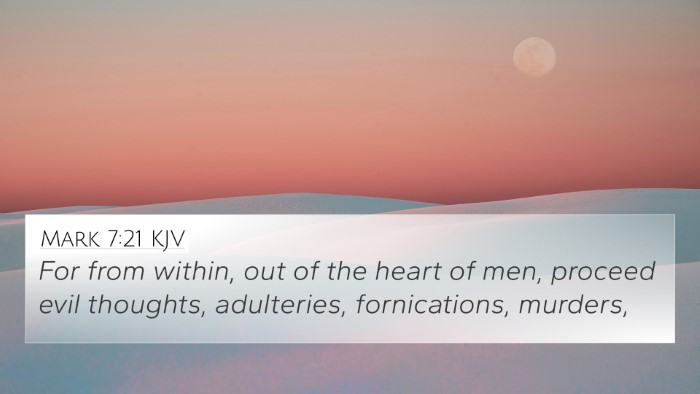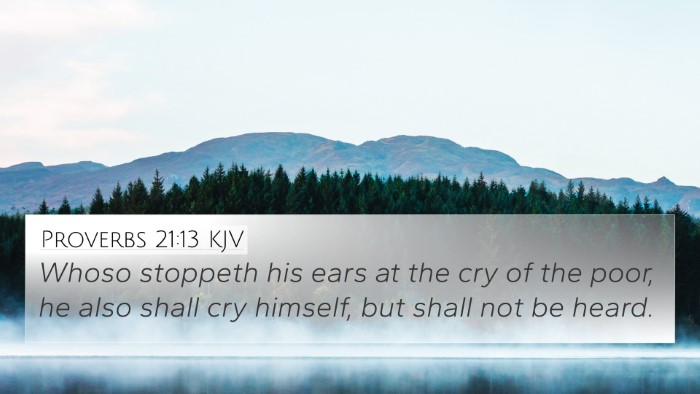Understanding Proverbs 21:10
Scripture Reference: Proverbs 21:10 - "The soul of the wicked desireth evil: his neighbour findeth no favour in his eyes."
Overview
This verse presents a stark contrast between the desires of the wicked and the relationship they have with others. It highlights the insatiable nature of wickedness and the lack of goodwill one experiences from such individuals.
Commentary Insights
Matthew Henry's Commentary
Matthew Henry emphasizes that the wicked are consumed by their sinful desires, which leads them to seek evil rather than good. Their inherent nature causes them to delight in malicious intent and undermines their capacity for kindness towards their neighbors. This internal disposition adversely affects their relationships, resulting in a lack of favor from those around them.
Albert Barnes' Notes
Albert Barnes elaborates that the wicked individual harbors an incessant longing for wrongdoing, which reflects a deeply entrenched moral depravity. This verse suggests that the wicked person's desire is contrary to the wellbeing of others, revealing the selfishness and insensitivity of their character. As a result, their neighbor is wary and finds no goodwill or favor in their eyes, leading to strained relationships.
Adam Clarke's Commentary
Adam Clarke notes that the word "soul" here indicates the core of the wicked person's being. Their yearning for evil signifies that their entire existence is geared toward harming others rather than uplifting them. The verse also suggests that such a desire creates a hostile environment, where the neighbor perceives no favor or compassion from the wicked individual. Clarke stresses the importance of recognizing the detrimental effects of wickedness not only on the wicked but also on societal harmony.
Bible Verse Cross-References
Proverbs 21:10 has thematic connections across various scriptures, enhancing its meaning and providing a deeper understanding. Here are some key verses that relate to this theme:
- Proverbs 4:16 - "For they sleep not, except they have done mischief; and their sleep is taken away, unless they cause some to fall."
- Proverbs 12:12 - "The wicked desireth the net of evil men: but the root of the righteous yieldeth fruit."
- Romans 1:30 - "Being filled with all unrighteousness, fornication, wickedness, covetousness, maliciousness; full of envy, murder, debate, deceit, malignity; whispers."
- Matthew 7:17-18 - "Even so every good tree bringeth forth good fruit; but a corrupt tree bringeth forth evil fruit."
- Proverbs 15:29 - "The Lord is far from the wicked: but he heareth the prayer of the righteous."
- James 4:4 - "Ye adulterers and adulteresses, know ye not that the friendship of the world is enmity with God?"
- Galatians 5:19-21 - "Now the works of the flesh are manifest, which are these; Adultery, fornication, uncleanness, lasciviousness..."
Thematic Connections
Proverbs 21:10 touches on themes of:
- Moral Depravity: The internal struggle and destructive desires of the wicked.
- Interpersonal Relationships: Highlighting the impact of one’s character on others.
- Divine Justice: Reflecting how the wicked’s desires lead to inevitable consequences.
- Spiritual Warfare: Understanding the battles between good and evil within human nature.
Connections Between Bible Verses
In performing a comparative Bible verse analysis, one can see ties between the desires of the wicked in Proverbs and the broader teachings of Scripture. Employing tools for Bible cross-referencing, one can discern how themes of good and evil thread throughout both the Old and New Testaments. This interconnectedness allows for a holistic understanding of moral teachings and divine principles.
Conclusion
Proverbs 21:10 serves as a reminder of the consequences of wickedness and the importance of fostering goodwill in our relationships. It encourages readers to reflect on their desires and the impacts these have on others. In understanding the cross-references and themes drawn from this verse, one can appreciate the Biblical narrative's depth and applicability to personal conduct.
Further Study
To explore more about cross-referencing Biblical texts, one may consider utilizing a Bible concordance or engaging in Bible cross-reference studies. Focused studies on the links between the Prophets and Apostolic teachings can also yield rewarding insights for sermon preparation or personal growth.


















